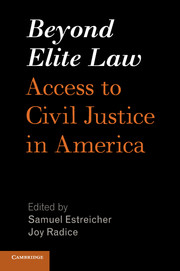Book contents
- Frontmatter
- Contents
- Beyond Elite Law
- Foreword
- List of Contributors
- Overview
- Overview
- PART I CURRENT STATE OF ACCESS TO LEGAL SERVICES
- 1 Access to Civil Justice in America: What Do We Know?
- 2 Life in the Law-Thick World: Legal Resources for Ordinary Americans
- 3 The Need for a National Civil Justice Survey of Incidence and Claiming Behavior
- 4 When Does Representation Matter?
- 5 Self-Representation and the Dismissal of Chapter 7 Bankruptcy Cases
- 6 Racial Disparities in Legal Representation for Employment Discrimination Plaintiffs
- 7 The Unemployment Action Center: A Student-Driven Response to a Legal Need
- 8 Immigrant Representation: Meeting an Urgent Need
- 9 Self-Representation, Civil Gideon, and Community Mobilization in Immigration Cases
- PART II SOURCES OF LEGAL SERVICES ASSISTANCE FOR WORKING AMERICANS
- PART III FASHIONING A REFORM AGENDA
- PART IV CREATING A CULTURE OF SERVICE
- Index
2 - Life in the Law-Thick World: Legal Resources for Ordinary Americans
from PART I - CURRENT STATE OF ACCESS TO LEGAL SERVICES
Published online by Cambridge University Press: 05 May 2016
- Frontmatter
- Contents
- Beyond Elite Law
- Foreword
- List of Contributors
- Overview
- Overview
- PART I CURRENT STATE OF ACCESS TO LEGAL SERVICES
- 1 Access to Civil Justice in America: What Do We Know?
- 2 Life in the Law-Thick World: Legal Resources for Ordinary Americans
- 3 The Need for a National Civil Justice Survey of Incidence and Claiming Behavior
- 4 When Does Representation Matter?
- 5 Self-Representation and the Dismissal of Chapter 7 Bankruptcy Cases
- 6 Racial Disparities in Legal Representation for Employment Discrimination Plaintiffs
- 7 The Unemployment Action Center: A Student-Driven Response to a Legal Need
- 8 Immigrant Representation: Meeting an Urgent Need
- 9 Self-Representation, Civil Gideon, and Community Mobilization in Immigration Cases
- PART II SOURCES OF LEGAL SERVICES ASSISTANCE FOR WORKING AMERICANS
- PART III FASHIONING A REFORM AGENDA
- PART IV CREATING A CULTURE OF SERVICE
- Index
Summary
Gillian Hadfield and Jamie Heine demonstrate that a very small percentage of the legal resources in the vast U.S. legal market is delivered on behalf of poor or middle-income people – indeed, overall the U.S. devotes fewer resources on a per case basis to courts, judges, legal aid, and even in some cases lawyers than Western European countries. Americans of modest means are more likely to “lump” their legal problems together and do nothing about them than their European counterparts. One important factor is the greater availability of non-lawyer assistance in Europe, which suggests an important avenue for U.S. reform.
Ours is a law-thick world. Most advanced market democracies are pervaded by laws and rules that structure social and economic relationships. Ordinary people, businesses, and institutions alike interact with rules and legal principles both formally and informally on a daily basis: the “defining circumstances” of everyday life – employment, consumer transactions, family dynamics, financial matters, and more – all have legal dimensions. The United States has a particularly complex and expansive civil legal system, partly because of America's uniquely adversarial approach to law and policy. Navigating the web of complex rules that comprises our social and economic framework requires legal resources — legal information, advice, documents, representation; the rule of law presumes access to the civil legal system and legal resources. But what does the landscape of legal resources look like for ordinary Americans? Are we living in an environment that is thick with law but thin on legal resources?
Unfortunately, we know very little about the legal—resource landscape, especially when it comes to services for Americans of average means. We don't have a national federally funded research agency like the National Institutes of Health, which distributes over $30 billion in 50,000 grants annually to medical researchers who collect, analyze, and are often required to share, data on disease, medical procedures and the impact of interventions. We don't have the legal equivalent of public health departments, tracking the legal health of communities. We don't have the legal analogs of specialists in epidemiology, studying the causes and patterns of legal problems in communities. While legal academia produces thousands of articles published in law reviews each year, such research typically focuses on law itself, not the public or markets the law serves.
- Type
- Chapter
- Information
- Beyond Elite LawAccess to Civil Justice in America, pp. 21 - 52Publisher: Cambridge University PressPrint publication year: 2016
- 9
- Cited by



